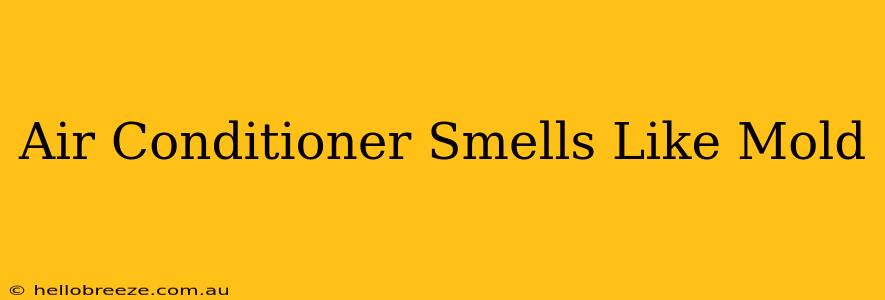Is your air conditioner emitting a musty, moldy odor? This isn't just unpleasant; it can also indicate a potential health hazard. A moldy-smelling AC unit signifies the presence of moisture and organic matter, creating the perfect breeding ground for various mold and mildew species. This post will explore the causes, prevention strategies, and effective cleaning methods to banish that awful smell and ensure your air conditioner operates efficiently and safely.
Why Does My AC Smell Like Mold?
Several factors contribute to a moldy smell emanating from your air conditioner:
1. Dirty Evaporator Coil:
The evaporator coil, located inside your air handler or furnace, is a prime location for mold growth. Moisture condenses on this coil during operation, and if it's not clean, dust, dirt, and debris provide a nutrient-rich environment for mold to thrive. This is arguably the most common cause of a moldy AC smell.
2. Clogged Drain Line:
The condensate drain line removes excess moisture from the evaporator coil. If this line becomes clogged with algae, mold, or debris, the water can back up, leading to mold growth in the drain pan and ultimately, a foul odor.
3. Dirty Air Filter:
A dirty air filter restricts airflow, reducing the efficiency of your AC and increasing the chance of moisture buildup on the evaporator coil. This restricted airflow can create a humid environment perfect for mold propagation.
4. Lack of Regular Maintenance:
Ignoring regular maintenance is a significant contributor to mold growth. A neglected AC unit provides ample opportunity for mold spores to settle and multiply.
5. Mold Growth in the Ductwork:
Mold can sometimes grow within the ductwork itself. This is less common but requires professional attention to remediate. Leaks in the ductwork can introduce moisture, while poor air quality can encourage mold growth.
Preventing Mold Growth in Your Air Conditioner
Prevention is far easier than remediation. Here's how to keep your AC smelling fresh:
- Regular Air Filter Changes: Change your air filter every 1-3 months, or more frequently if you have pets or allergies. A clean filter ensures proper airflow and reduces moisture buildup.
- Clean the Evaporator Coil: While this is best left to professionals, you can try cleaning the accessible portions with a coil cleaner (follow the manufacturer's instructions carefully).
- Check and Clean the Condensate Drain Line: Periodically inspect and clean the drain line to prevent clogs. You might need a shop vac or compressed air to clear blockages.
- Schedule Annual Maintenance: Professional AC maintenance involves a thorough cleaning of all components, including the evaporator coil, drain line, and fan motor. This is crucial for preventing mold and extending the life of your system.
Cleaning Your Air Conditioner to Eliminate Mold Odor
For minor mold issues, you can attempt cleaning yourself. However, for severe mold infestations or if you're unsure about any aspect of the cleaning process, it's best to call a qualified HVAC technician.
Important Safety Note: Always disconnect the power supply to your air conditioner before attempting any cleaning.
Steps for Cleaning (for accessible components only):
- Gather Supplies: You'll need a coil cleaner, a brush or sponge, a garden hose (for rinsing), and safety glasses.
- Clean the Evaporator Coil (if accessible): Use the coil cleaner according to the manufacturer's directions. Gently scrub the coil with the brush to loosen dirt and mold. Rinse thoroughly with the garden hose.
- Clean the Drain Pan: Remove any standing water and debris from the drain pan. Clean it with a disinfectant solution.
- Clean the Air Filter: Wash the air filter (if washable) or replace it with a new one.
When to Call a Professional
If the moldy smell persists after cleaning, or if you notice significant mold growth, contact a qualified HVAC technician. They possess the expertise and tools to address underlying issues and ensure thorough remediation. Ignoring a persistent mold problem can lead to further damage and potential health risks.
By following these preventative measures and cleaning steps, you can keep your air conditioner running efficiently, smelling fresh, and creating a healthy home environment. Remember, regular maintenance is key!

